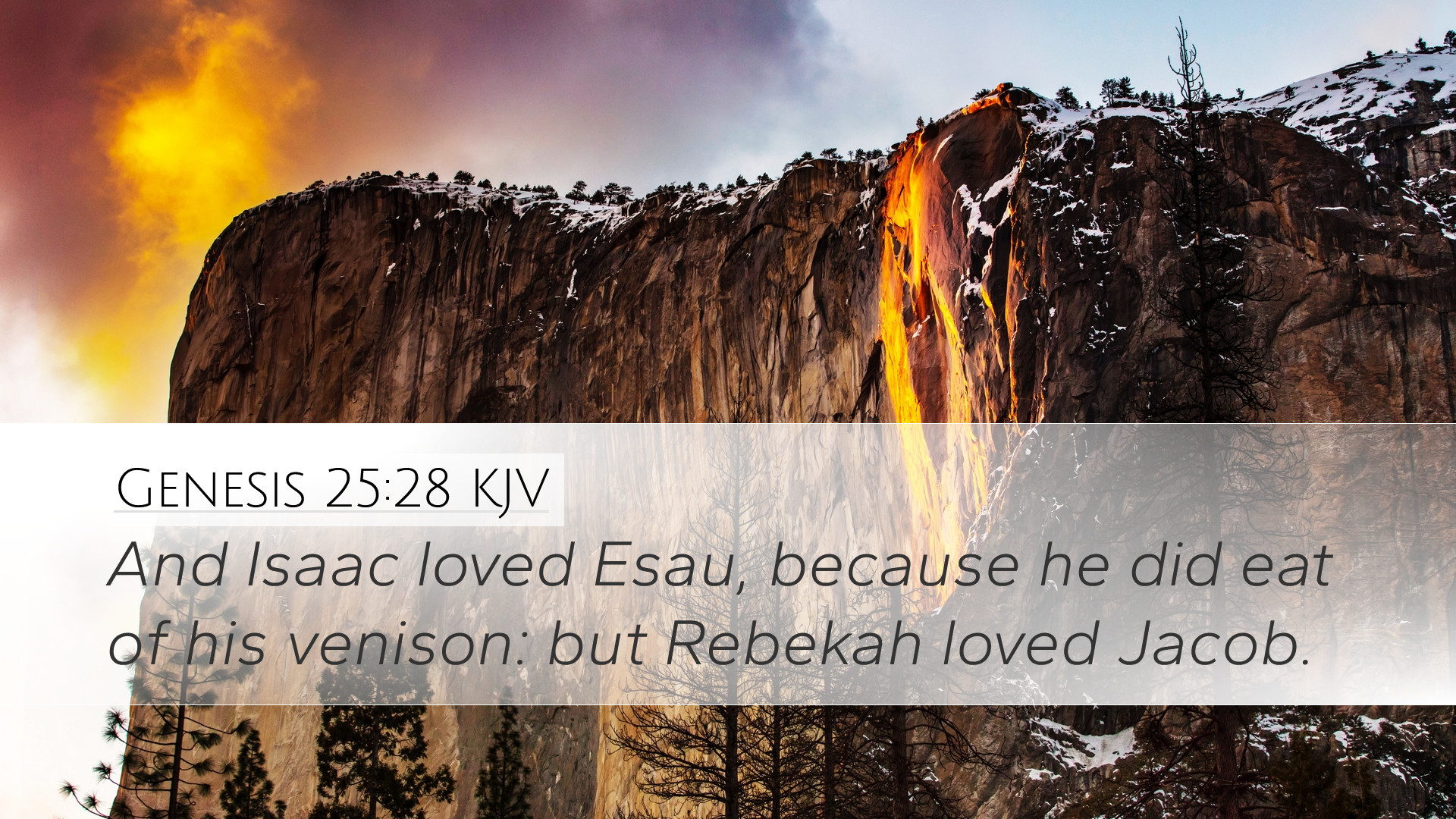Commentary on Genesis 25:28
Verse: “And Isaac loved Esau, because he did eat of his venison: but Rebekah loved Jacob.”
Introduction
The story of Isaac and his sons, Esau and Jacob, is filled with complex family dynamics and profound theological implications. Genesis 25:28 highlights the contrasting relationships between Isaac and Rebekah with their sons, revealing deep insights into the themes of favoritism, divine purpose, and human nature.
Contextual Overview
This verse is part of a larger narrative that describes the birth and early lives of the twin sons of Isaac and Rebekah. Following the prophetic announcement of their births and their struggle within the womb (Genesis 25:21-23), this verse brings attention to the favoritism displayed by the parents, setting the stage for later conflicts that will arise between the brothers.
Analysis of the Text
Isaac's Favoritism Towards Esau
Isaac’s preference for Esau stems from his appreciation of Esau’s hunting skills and the sustenance that came from it. As noted by Matthew Henry, “Isaac was pleased with the sort of meat which he loved and enjoyed.” This choice reflects not merely a preference for food but also highlights a cultural valuation of hunter-gather roles in ancient society where prowess in hunting was often admired.
Rebekah's Love for Jacob
Conversely, Rebekah’s love for Jacob seems tied to his more domestic role, as he is described as a “plain man” (Genesis 25:27). Albert Barnes observes that “He dwelled in tents,” suggesting Jacob’s affinity for a settled life, possibly a reflection of divine purpose as Jacob would eventually become the father of the Israelite nation.
The Clash of Familial Affections
This division of affections leads to significant implications for the family. Adam Clarke comments on how “such partiality is greatly prejudicial and is a source of discord and division.” Favoritism within families often leads to jealousy and rivalry, setting a destructive precedent for both Isaac and Rebekah's family and the brothers' future relationship.
Theological Implications
The contrast between Isaac and Rebekah’s affections for their sons also serves as a commentary on the overarching theme of divine election that runs throughout the scriptures. This concept of God choosing the younger over the elder (Jacob over Esau) foreshadows the larger narrative of Israel’s election as God’s chosen people, a theme that is pivotal in biblical theology.
Divine Sovereignty
In choosing Jacob, God’s sovereignty is emphasized. As noted in Romans 9:10-13, Paul references the love of God for Jacob and the hatred for Esau, which speaks to God’s prerogative in choosing whom He desires. This makes clear that divine purposes are not necessarily aligned with human expectations or societal norms.
Human Responsibility
Simultaneously, the text invites reflection on human responsibility. The favoritism displayed by Isaac and Rebekah, while occurring in the context of God’s sovereign plan, also highlights the moral failures of each parent. As Matthew Henry reflects, “Though in the counsel of God there was a purpose concerning Jacob, it did not excuse the sins of his parents,” reminding us of the interplay between divine sovereignty and human agency.
Lessons for Today's Believers
This narrative offers several lessons for current believers, including the dangers of favoritism, the complexities of family relationships, and the assurance of God's sovereign choice in the world.
Favoritism and Its Consequences
Believers are cautioned against the perils of favoritism, as it can sow discord within families and communities. As Albert Barnes notes, such behavior can lead to jealousy and animosity. The Christian community is called to love equally and foster unity, reflecting the heart of God towards all His children.
Understanding God’s Sovereign Will
Furthermore, this scripture encourages believers to embrace God's sovereignty in their lives. Just as God had a plan for Jacob, believers can trust that God has a purpose for each individual. This understanding provides comfort in times of uncertainty and encourages a faithful response to God’s calling.
Conclusion
Genesis 25:28 serves as a microcosm of the human experience within the larger narrative of God’s redemptive plan. By examining the passage through the lens of various commentaries, one discerns the critical interplay between divine sovereignty and human frailty. This verse challenges both pastors and scholars to reflect on family dynamics, the nature of divine choice, and the implications for both personal faith and communal life.


